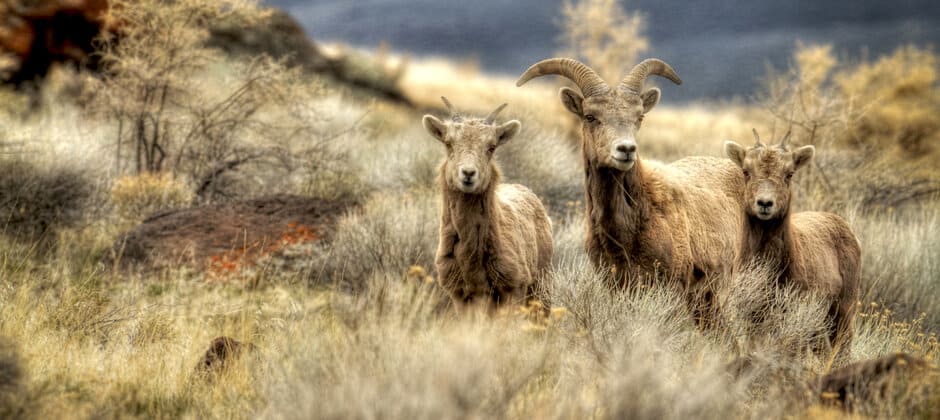Share this article
Lawsuit challenges domestic sheep grazing in bighorn habitat
The U.S. Forest Service is endangering bighorn sheep (Ovis canadensis) on the Okanogan-Wenatchee National Forest, in eastern Washington state by allowing domestic sheep to graze near the wild herds, according to a new lawsuit filed last week in federal court.
The lawsuit, brought by WildEarth Guardians and the Western Watersheds Project, alleges that USFS officials are aware of the risks of permitting grazing near bighorn sheep herds and contends that they are knowingly placing the forest’s herd at high risk of disease outbreaks.
Domestic sheep can transmit the pathogen Mycoplasma, which causes pneumonia, to bighorn sheep. The disease can kill bighorns and, in subsequent years, can reduce lamb survival. Many sheep grazing allotments on federal land in Washington, Oregon and Idaho have been closed in recent years in order to protect bighorn sheep. The USFS and the Bureau of Land Management both use a model that assesses the risk of contact between domestic sheep and bighorns based on the available habitat and bighorns’ home ranges.
Washington is home to 16 bighorn sheep herds, with nine living in or near the Okanogan-Wenatchee National Forest. Four of these herds live on or near the allotments in questions in the lawsuit; these four herds contain about two-thirds of all bighorn sheep in the Okanogan-Wenatchee National Forest and almost half of the bighorn sheep in the state.
The plaintiffs allege that although the USFS analyzed the allotments in 2016 and concluded that domestic sheep grazing on the allotments pose a high risk to these four herds, it continues to allow grazing there. About 10 years ago, the USFS proposed new management standards to prevent contact between domestic and bighorn sheep on the forest, but it still has not finalized or begun to apply those standards.
In October, the Washington Department of Fish & Wildlife lethally removed a dozen bighorns from a herd elsewhere in the state after they had contact with a domestic sheep. Later that month, the state agency detected Mycoplasma in the Cleman Mountain herd, one of the four herds ranging on the challenged allotments. The agency plans to continue to monitor that herd for signs of an outbreak.
The Wildlife Society and the American Association of Wildlife Veterinarians have issued a joint statement on domestic sheep and goat disease transmission risk to wild sheep. The statement recognizes that disease transmission from domestic sheep and goats to wild sheep is a primary risk factor for wild sheep survival, restoration and management and emphasizes the need to develop and implement adaptive disease management strategies to address chronically infected wild sheep populations.
Read the TWS and AAWV Joint Issue Statement: Domestic Sheep and Goats Disease Transmission Risk to Wild Sheep
Read TWS’ Standing Position on Wildlife Disease
Header Image: A lawsuit challenged grazing allotments in the Okanogan-Wenatchee National Forest, in eastern Washington state, for exposing bighorn sheep to a high risk of disease transmission. Credit: BLM Oregon & Washington








